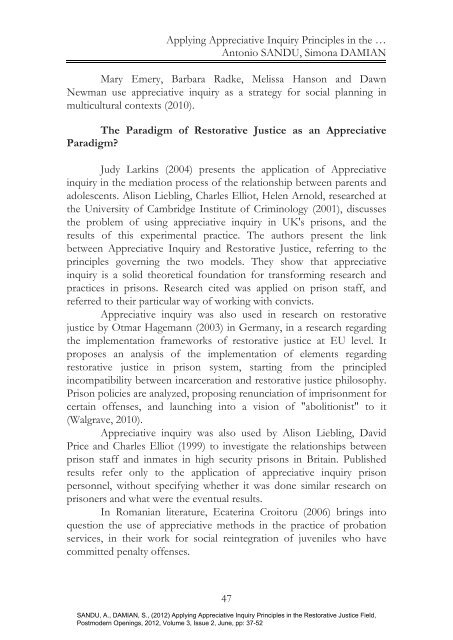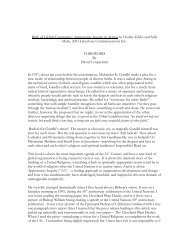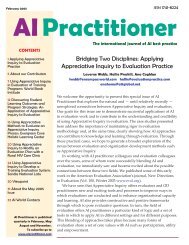Applying Appreciative Inquiry Principles in the Restorative Justice ...
Applying Appreciative Inquiry Principles in the Restorative Justice ...
Applying Appreciative Inquiry Principles in the Restorative Justice ...
You also want an ePaper? Increase the reach of your titles
YUMPU automatically turns print PDFs into web optimized ePapers that Google loves.
<strong>Apply<strong>in</strong>g</strong> <strong>Appreciative</strong> <strong>Inquiry</strong> <strong>Pr<strong>in</strong>ciples</strong> <strong>in</strong> <strong>the</strong> …<br />
Antonio SANDU, Simona DAMIAN<br />
Mary Emery, Barbara Radke, Melissa Hanson and Dawn<br />
Newman use appreciative <strong>in</strong>quiry as a strategy for social plann<strong>in</strong>g <strong>in</strong><br />
multicultural contexts (2010).<br />
The Paradigm of <strong>Restorative</strong> <strong>Justice</strong> as an <strong>Appreciative</strong><br />
Paradigm?<br />
Judy Lark<strong>in</strong>s (2004) presents <strong>the</strong> application of <strong>Appreciative</strong><br />
<strong>in</strong>quiry <strong>in</strong> <strong>the</strong> mediation process of <strong>the</strong> relationship between parents and<br />
adolescents. Alison Liebl<strong>in</strong>g, Charles Elliot, Helen Arnold, researched at<br />
<strong>the</strong> University of Cambridge Institute of Crim<strong>in</strong>ology (2001), discusses<br />
<strong>the</strong> problem of us<strong>in</strong>g appreciative <strong>in</strong>quiry <strong>in</strong> UK's prisons, and <strong>the</strong><br />
results of this experimental practice. The authors present <strong>the</strong> l<strong>in</strong>k<br />
between <strong>Appreciative</strong> <strong>Inquiry</strong> and <strong>Restorative</strong> <strong>Justice</strong>, referr<strong>in</strong>g to <strong>the</strong><br />
pr<strong>in</strong>ciples govern<strong>in</strong>g <strong>the</strong> two models. They show that appreciative<br />
<strong>in</strong>quiry is a solid <strong>the</strong>oretical foundation for transform<strong>in</strong>g research and<br />
practices <strong>in</strong> prisons. Research cited was applied on prison staff, and<br />
referred to <strong>the</strong>ir particular way of work<strong>in</strong>g with convicts.<br />
<strong>Appreciative</strong> <strong>in</strong>quiry was also used <strong>in</strong> research on restorative<br />
justice by Otmar Hagemann (2003) <strong>in</strong> Germany, <strong>in</strong> a research regard<strong>in</strong>g<br />
<strong>the</strong> implementation frameworks of restorative justice at EU level. It<br />
proposes an analysis of <strong>the</strong> implementation of elements regard<strong>in</strong>g<br />
restorative justice <strong>in</strong> prison system, start<strong>in</strong>g from <strong>the</strong> pr<strong>in</strong>cipled<br />
<strong>in</strong>compatibility between <strong>in</strong>carceration and restorative justice philosophy.<br />
Prison policies are analyzed, propos<strong>in</strong>g renunciation of imprisonment for<br />
certa<strong>in</strong> offenses, and launch<strong>in</strong>g <strong>in</strong>to a vision of "abolitionist" to it<br />
(Walgrave, 2010).<br />
<strong>Appreciative</strong> <strong>in</strong>quiry was also used by Alison Liebl<strong>in</strong>g, David<br />
Price and Charles Elliot (1999) to <strong>in</strong>vestigate <strong>the</strong> relationships between<br />
prison staff and <strong>in</strong>mates <strong>in</strong> high security prisons <strong>in</strong> Brita<strong>in</strong>. Published<br />
results refer only to <strong>the</strong> application of appreciative <strong>in</strong>quiry prison<br />
personnel, without specify<strong>in</strong>g whe<strong>the</strong>r it was done similar research on<br />
prisoners and what were <strong>the</strong> eventual results.<br />
In Romanian literature, Ecater<strong>in</strong>a Croitoru (2006) br<strong>in</strong>gs <strong>in</strong>to<br />
question <strong>the</strong> use of appreciative methods <strong>in</strong> <strong>the</strong> practice of probation<br />
services, <strong>in</strong> <strong>the</strong>ir work for social re<strong>in</strong>tegration of juveniles who have<br />
committed penalty offenses.<br />
47<br />
SANDU, A., DAMIAN, S., (2012) <strong>Apply<strong>in</strong>g</strong> <strong>Appreciative</strong> <strong>Inquiry</strong> <strong>Pr<strong>in</strong>ciples</strong> <strong>in</strong> <strong>the</strong> <strong>Restorative</strong> <strong>Justice</strong> Field,<br />
Postmodern Open<strong>in</strong>gs, 2012, Volume 3, Issue 2, June, pp: 37-52






